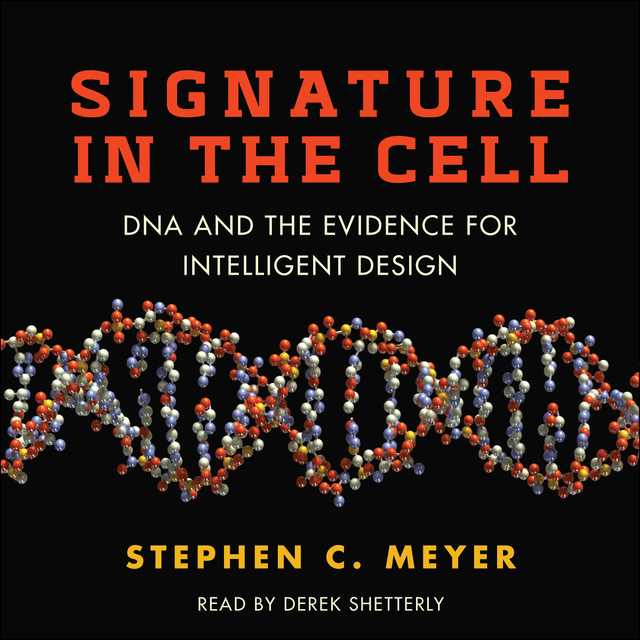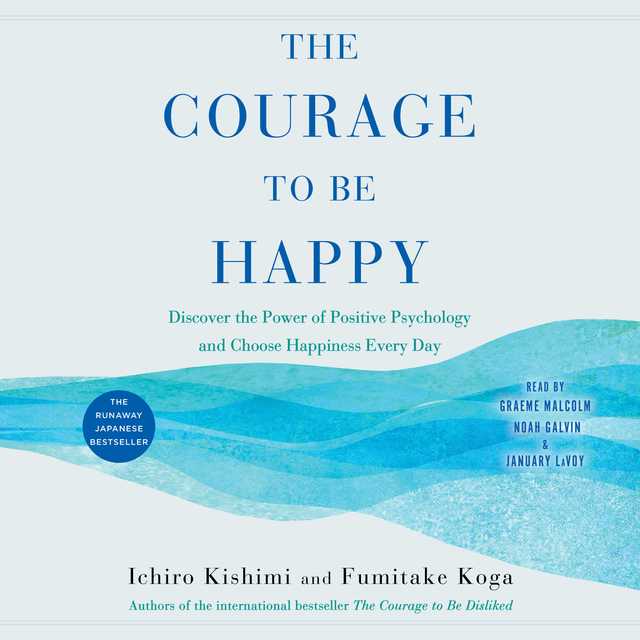Signature in the Cell Audiobook Summary
Named one of the top books of 2009 by the Times Literary Supplement (London), this controversial and compelling audiobook from Dr. Stephen C. Meyer presents a convincing new case for intelligent design (ID), based on revolutionary discoveries in science and DNA. Along the way, Meyer argues that Charles Darwin’s theory of evolution as expounded in The Origin of Species did not, in fact, refute ID. If you enjoyed Francis Collins’s The Language of God, you’ll find much to ponder–about evolution, DNA, and intelligent design–in Signature in the Cell.
Other Top Audiobooks
Signature in the Cell Audiobook Narrator
Derek Shetterly is the narrator of Signature in the Cell audiobook that was written by Stephen C. Meyer
Stephen C. Meyer received his Ph.D. from the University of Cambridge in the philosophy of science after working as an oil industry geophysicist. He now directs the Center for Science and Culture at the Discovery Institute in Seattle, Washington. He authored Signature in the Cell, a (London) Times Literary Supplement Book of the Year.
About the Author(s) of Signature in the Cell
Stephen C. Meyer is the author of Signature in the Cell
More From the Same
- Author : Stephen C. Meyer
- Return of the God Hypothesis
- Darwin’s Doubt
- Publisher : HarperAudio
- Abraham
- American Gods [TV Tie-In]
- Dead Ringer
- House of Sand and Fog
- Prey
Signature in the Cell Full Details
| Narrator | Derek Shetterly |
| Length | 19 hours 16 minutes |
| Author | Stephen C. Meyer |
| Category | |
| Publisher | HarperAudio |
| Release date | December 20, 2016 |
| ISBN | 9780062652539 |
Subjects
The publisher of the Signature in the Cell is HarperAudio. includes the following subjects: The BISAC Subject Code is Philosophy & Social Aspects, Science
Additional info
The publisher of the Signature in the Cell is HarperAudio. The imprint is HarperAudio. It is supplied by HarperAudio. The ISBN-13 is 9780062652539.
Global Availability
This book is only available in the United States.
Goodreads Reviews
Randy
October 22, 2011
The year 2009 marked the 150th anniversary of the publication of the Origin of Species by Charles Darwin. This caused a lot of reflection about the legacy of Darwin, about what his greatest contribution is thought to be. Although the theory of evolution leaps to mind, many scholars believe that Darwin's legacy is not so much his theory per se but the consequences of his theory: that by providing a completely materialistic account of biological history he refuted the classical argument from design, the idea that nature bears witness to a designing intelligence. Richard Dawkins echoes this sentiment in his book The Blind Watchmaker: "Biology is the study of complicated things that give the appearance of having been designed for a purpose." The operative word here is "appearance" because it is thought that unguided material processes can counterfeit the appearance of design, that design is in fact illusory. It is a legitimate question to ask, was Darwin right? Can every appearance of design in biology be accounted for by undirected material processes? With these questions in mind, Stephen Meyer turns his attention to an area of biology that Darwin left unaddressed, and that is the origin of the first life. What was once thought to be a fairly straightforward question in Darwin's day and for almost a century thereafter turned out to be something entirely different with a discovery made by Francis Crick in 1957. Four years after discovering, along with James Watson, the structure of the DNA molecule, Crick formulated his "sequence hypothesis." This was the realization that the four chemical bases along the spine of the DNA molecule functioned just like alphabetical characters in a written language or digital characters in a machine code. DNA, then, is the carrier of vast amounts of complex specified information. Where did this information come from? To answer this question Meyer utilized the same method of scientific reasoning that Darwin used, and that is one of multiple competing hypotheses. You compare different possible causal explanations to try to explain a given effect or event in the remote past. You evaluate them to see which cause best explains the evidence and then you infer that cause which provides the best explanation. What constitutes the best explanation? According to Darwin it was the one that referred to a cause which is known from our uniform and repeated experience to produce the effect in question. And according to Darwin's scientific mentor, Charles Lyell, the famous geologist, we should be looking for causes now in operation. Now, an obvious cause of information-rich sequences is intelligence. That is not controversial. Computer programs are designed by programmers, and the similarity between DNA and computer software is uncanny, so certainly here we have a strong appearance of design. We know that intelligence has the causal power to produce information. But perhaps unguided material processes are actually a better explanation for the origin of information in living things. To answer this question Meyer devotes a lengthy part of the book to review the history of chemical evolution, the attempts to explain how life came from non-life, using only unguided material processes. These fall into the categories of chance, necessity, or some combination of the two. After his lengthy survey he concludes that none are satisfactory, and that even Richard Dawkins, "not known for rhetorical restraint in support of evolutionary orthodoxy, candidly admitted in 2008 that 'no one knows' how life arose in the first place" (p.333). Thus Meyer concludes that, using Darwin's own method, if you look at all the competing classes of causal explanations that have been proposed to explain the origin of information, that intelligent design is the best explanation. Neither chance, law-like necessity, nor the combination of the two have demonstrated the power to produce information. But intelligent agents have repeatedly done so. Now, this principle is conceded by scientists in other fields such as those in the SETI project, the Search for Extraterrestrial Intelligence. If they were to find information embedded in a radio signal coming from outer space, they would assume it was coming from an intelligence. In any other realm of experience (eg. archeology, forensics, cryptography) when we find the hallmarks of information we readily infer design. That is the essence of the argument at the first-order level, the level of evidence and reasoning to a conclusion. But with intelligent design the debate is also at the second-order level. This is the level of discussion where the nature of science, knowledge, and rationality are at issue. Frequently it is hard to get to the first-order questions of evidence because people get hung up on the second-order issues. So Meyer devotes the last portion of the book addressing these questions, ones like is intelligent design science? He argues that, since the early 1980's, philosophers of science have rejected demarcation criteria that have been used to distinguish science from pseudo-science because any given demarcation criteria, whether it is observability, explains by natural law, or what have you, if it is applied too stringently it ends up excluding not only intelligent design but also areas that are already accepted as part of science. Meyer makes the interesting point that insisting that intelligent design is not science merely reclassifies it; it does nothing to answer the question of whether it might be true. We know that both natural and intelligent (or agent) causes are interwoven in our everyday experiences, and we can distinguish between them. How do we know from the outset that only natural causes played a part in the history of biology? Is science to be the search for truth, or merely the search for the best naturalistic explanation? Those who are willing to concede that design might in principle be empirically detectable, but who nevertheless think that intelligent design is a dead end for science would do well to read this section of the book. Meyer gives a whole host of research questions that are suggested by a design paradigm, some of which are already being pursued. For example, Jonathan Wells has suggested that centrioles, tiny structures involved in cell division, are actually tiny molecular machines, turbines, which possibly malfunction when the abnormal cell division of cancer occurs. This is not a question that occurs to those operating in a evolutionary paradigm, who think of cancer as arising exclusively from mutations in the DNA (p.487). Meyer lists other testable predictions that intelligent design makes that can be compared to those made by evolutionary science. For example, until fairly recently it was thought that the preponderance of "junk DNA" in the genome was evidence not of design but of undirected evolutionary processes. Design theorists back in the early 1990's, however, predicted that most of this "junk DNA" would in fact turn out to serve useful functions, and that is precisely what we are seeing with recent discoveries. Design was properly a part of biology prior to 1859. It is ironic that, as Darwin's one long argument in the Origin seemed to render this idea irrelevant except to the eyes of faith, now Stephen Meyer, by using Darwin's own method of argumentation, has made design once again a necessary explanatory concept in the natural world. For those interested in a summary of Meyer's argument but who get bogged down in this long book, I would recommend a one-hour lecture he gives, entitled "DNA by Design", available on DVD from Access Research Network.
Michael
September 26, 2012
He never touched religion in this, which was a wise move. I have always had a nagging disbelief of evolution and this book with a few others just sealed the deal. Pure science, not big corporate science, will leave evolution in the scrap pile with Marxism and Freud. The fossil record is a joke, you can't test evolution, and the fact the Darwinists get so mad is proof that the legs of evolution are built on sand. Lets move science into the next century and get the atheists out of it.
Richard
December 16, 2009
Greetings!This is a must read for very one interested in the origin of life issues. Steven Meyer's new book, Signature in the Cell, takes the reader on a breath-taking journey through modern scientist's findings that definitively demonstrates the improbability of life arising by chance. Don't miss this journey. Loaded with references, the Stephen Meyer takes you through his journey of discovery during his lifetime. Richard William Nelson
Steve
October 06, 2010
A really good Intelligent Design apologetic. Along the lines of Behe, Meyer shows how the new understanding of DNA eliminates chance as a possible explanation for the the origins of life, DNA, RNA and enzymes. After reading this book one wonders how the theory of Evolution can survive, except that its opponents will continue to be dismissed in the media or silenced in academia.
Richard
December 22, 2009
i liked the book, i enjoyed reading it, the only problem is that he is wrong.first, id, is fruitless as a research theory, mostly because it causes the discussion to rise from the science level to the theolological, it is a lot more interesting to discuss the designer than it is to talk about how.second, is that he is really discussing abiogenesis and through a sleight of hand trick says that this criticism makes the neo-darwinian synthesis suspect. nope, creating the first replicator is not the same thing as evolution.third is the usual confusion of levels that happens in these discussions. partly it is about what is science and what is metaphysics, partly it's a confusion over the term chance, which straddles the line between these levels.but the biggest one is that it really is a god of the gaps argument. as a Christian i see everything as the will of God, when it rains on my house and when it doesn't. but as a student of science i find god elusive and invisible, to explain why it didn't rain on my house last night i don't resort to God's nature but to meteorology. but that doesn't challenge my faith that God is in control. but a god of the gaps argument seems to find god only in those ever-diminishing gaps, not everywhere as the final and most important reference.anyhow, it's good, take the time to read and understand it, a good entry into the debate.
Scott
August 07, 2011
I’m not sure I can say more than what’s already been said about this. Atheist philosopher Thomas Nagel called it one of the best books of 2009 (albeit, the paperback came out in 2010) and the American Spectator called it a “defining work in the origins debate.” It was really long (around 625 pages, if you include the footnotes), but definitely went beyond what I was expecting. I’m a layman, and therefore can’t think of any wondrous objections to it, but I’m still waiting to see how things turn out as it’s fairly new. Be careful in looking for criticisms though, as some of the people who gave bad remarks about it didn’t actually read it (Jerry Coyne and Fransisco Ayala, to name a few).
Barton
February 13, 2019
One of the most articulate speakers and writers I have heard or read, Stephen C. Meyer makes what I would assess to be an irrefutable case for Intelligent Design…based upon the bankruptcy of unguided materialistic processes to explain the biological information needed for DNA in living cells to get up and running…to reach the state of functional survival and reproduction. Meyer’s excellent writing style combined with the interesting subject-matter of the origin of life and the specified complexity needed to originate and sustain life…kept me reading page after page. Meyer finds just the right blend between popular accessibility and scholarly detail. At 508 pages long it is worth reading every page. For anyone interested in this important current topic…I would highly recommend this book.
Shane
December 06, 2011
Meyer does a convincing job of showing why intelligent design should be considered a scientific theory for the origin of life. As a scientist himself, Meyer can at times be over the head of the casual reader, but the gist of it is, that the information that is contained within the cell had to have originated somewhere, and current theories fail to adequately explain how it did so. He makes the case that intelligent design is the best explanation for how DNA and the coded information thereon came about.
Jeff
September 22, 2012
What a great book. It is dense and intellegent, but I also found it accessable. I can understand how atheists get upset with this book as it picks apart neoDarwinism (the religion of many atheists), but this theory does not say who is the designer. It just says one exists.
Todd
July 13, 2015
While the biochemistry sections made for some tough sledding, Meyer's analysis of the arguments of Darwinists is clear and easy to follow. This is a laudable work and should be read by all who care, one way or the other, about the intelligent design debate.
David
January 11, 2014
I read this book before Darwin's Doubt, which I don't recommend especially if you are new to genetics topics.I learned a heap from this book. I finally understand what gene expression it, how proteins are made, how DNA directs protein creation, what proteins do, how unbelievable complex DNA is and also how complex proteins are. There is a great animation at http://www.signatureinthecell.com showing the basics of how it works. Amazing stuff.Further amazing is how improbable random mutations and natural selections can account for the information that is inherent in DNA and proteins and how epi-genetics operate etc. Meyer shows that there has not been enough time for enough events to have occurred since the creation of the universe to randomly create just a simple protein - such is the complexity of the amino acids that make a protein. And there are several hundred of these in the human body.It is a long book and covers a lot of ground. Meyer makes his case that Darwinism is unable to explain the origins of the information in the cell. The amount of information coded in the DNA, proteins and all the bits that go together to make a cell function - is astounding. This complexity of specified information is far better explained by an intelligent design that random undirected mutations. That is his thesis. Meyer also spends time showing the ID is a science in the same sense of evolution being a science, that you cannot rule out ID without also ruling out darwinism by the same rule. I wasn't aware that the definition of science was such a hard topic, there is no universally accepted definition of science. Personally I was really impressed to see the strength of the argument for Intelligent Design. Meyer spends a few chapters explaining why it cannot be simply written off as religion or non-science. If you want to refute ID then you have a massive task in front of you. Many have tried, so far no one has succeeded.Meyer has made a strong case to write off Darwinism as being a good enough explanation for the origin of the information in the cell though. If you don't believe me then read the book and make up your own mind about how strong a case he makes. You may be surprised.
Mousa Alshaikh
June 21, 2018
Dr. Meyer is doing an excellent job of presenting his argument in a very complete and organized manner. The descriptions of intracellular processes are easy to understand for non-scientific readers, yet they are detailed enough to inform those who have the most interest. One thing I really admire is that unlike many who have an opinion in this area, it does not dive into calling names or making fun of opponents. It refers to hypocrisy and bias. His analysis of intracellular complexity, along with the very specific information contained in DNA sets a very positive argument for intelligent design. As he likes to point out, this is not just a refutation of Darwinism. It is the construction of a state of the only source we know about the arrival of life and the vast amounts of specific information contained in cells: intelligence.Certainly, Dr. Mayer has certified creative intelligence as a source of life in the universe, and the forerunner of the "laws of biology" is not only more credible but almost convincingly persuasive. "Signature in the Cell" is an excellent book.
Frequently asked questions
Listening to audiobooks not only easy, it is also very convenient. You can listen to audiobooks on almost every device. From your laptop to your smart phone or even a smart speaker like Apple HomePod or even Alexa. Here’s how you can get started listening to audiobooks.
- 1. Download your favorite audiobook app such as Speechify.
- 2. Sign up for an account.
- 3. Browse the library for the best audiobooks and select the first one for free
- 4. Download the audiobook file to your device
- 5. Open the Speechify audiobook app and select the audiobook you want to listen to.
- 6. Adjust the playback speed and other settings to your preference.
- 7. Press play and enjoy!
While you can listen to the bestsellers on almost any device, and preferences may vary, generally smart phones are offer the most convenience factor. You could be working out, grocery shopping, or even watching your dog in the dog park on a Saturday morning.
However, most audiobook apps work across multiple devices so you can pick up that riveting new Stephen King book you started at the dog park, back on your laptop when you get back home.
Speechify is one of the best apps for audiobooks. The pricing structure is the most competitive in the market and the app is easy to use. It features the best sellers and award winning authors. Listen to your favorite books or discover new ones and listen to real voice actors read to you. Getting started is easy, the first book is free.
Research showcasing the brain health benefits of reading on a regular basis is wide-ranging and undeniable. However, research comparing the benefits of reading vs listening is much more sparse. According to professor of psychology and author Dr. Kristen Willeumier, though, there is good reason to believe that the reading experience provided by audiobooks offers many of the same brain benefits as reading a physical book.
Audiobooks are recordings of books that are read aloud by a professional voice actor. The recordings are typically available for purchase and download in digital formats such as MP3, WMA, or AAC. They can also be streamed from online services like Speechify, Audible, AppleBooks, or Spotify.
You simply download the app onto your smart phone, create your account, and in Speechify, you can choose your first book, from our vast library of best-sellers and classics, to read for free.
Audiobooks, like real books can add up over time. Here’s where you can listen to audiobooks for free. Speechify let’s you read your first best seller for free. Apart from that, we have a vast selection of free audiobooks that you can enjoy. Get the same rich experience no matter if the book was free or not.
It depends. Yes, there are free audiobooks and paid audiobooks. Speechify offers a blend of both!
It varies. The easiest way depends on a few things. The app and service you use, which device, and platform. Speechify is the easiest way to listen to audiobooks. Downloading the app is quick. It is not a large app and does not eat up space on your iPhone or Android device.
Listening to audiobooks on your smart phone, with Speechify, is the easiest way to listen to audiobooks.

















![Torture Town [Dramatized Adaptation]](https://speechify.com/audiobooks/wp-content/uploads/sites/29/2023/06/pr_eaudio_9781648803703_640px.jpg)












